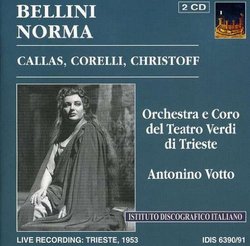| All Artists: Vincenzo Bellini, Antonino Votto, Trieste Verdi Theater Chorus, Trieste Verdi Theater Orchestra, Maria Callas, Boris Christoff, Elena Nicolai, Franco Corelli Title: Bellini: Norma Members Wishing: 1 Total Copies: 0 Label: Idi [Ital Disc Inst] Original Release Date: 1/1/1953 Re-Release Date: 3/25/2003 Album Type: Import, Live Genre: Classical Styles: Opera & Classical Vocal, Historical Periods, Modern, 20th, & 21st Century Number of Discs: 2 SwapaCD Credits: 2 UPCs: 675754595623, 8021945000896 |
Search - Vincenzo Bellini, Antonino Votto, Trieste Verdi Theater Chorus :: Bellini: Norma
 | Vincenzo Bellini, Antonino Votto, Trieste Verdi Theater Chorus Bellini: Norma Genre: Classical
|
Larger Image |
CD Details |
CD ReviewsMotley Perhaps, but Beautiful Monica | Romania | 01/20/2009 (5 out of 5 stars) "This CD is definitely for Callas and Corelli fans. If you want a complete version of Norma with clear sound, get the studio one. But if you want the mysterious thrill of one of the most famous but elusive live shows with this opera, take this set, since there is so much beautiful singing here.
According to several online sources, this is not an integral recording of the Norma show in Trieste, November 19, 1953. Since only disparate fragments of that Norma seem to have surfaced so far, the missing fragments were apparently replaced with recordings from other shows by Callas and Corelli. It seems that this was first done by Melodram and then, in an altered form, by Divina Records (the issues under those labels seem to have been discontinued, so they are rare). For more allegations about which fragments from other shows were interpolated, go to the Divina Records website. This label here is Instituto Discografico Italiano. Basically, one gets an almost "complete" Norma, and the important thing is that in all tracks Callas is in top form. The conductor is the heavy handed Antonino Votto and the orchestra of Trieste sounds awful. In the tracks said to have been interpolated from other sources, the orchestra and the conducing are better. There are also several technological cracks in the audio, and the recorded sound sometimes varies from louder to softer. This is for Callasians: despite the technological shortcomings and the incompleteness of the original material, this is a beautiful opportunity to hear Callas as Norma at the peak of her vocal and interpretative powers. The voice does sound different sometimes (as the fragments seem to be from various years), but all in all, it is equally powerful in all registers, with strikingly effective high notes, and a creamy lower register. Her interpretation is exquisite in nuances, and her harsher high notes are warranted, as they convey Norma's fury. The beautiful "Casta diva" on this CD seems to be from a later show, but it is so wonderfully sung, that you won't mind. This is for Corellians: despite the technological shortcomings and the incompleteness of the original material, this is an extremely rare opportunity to hear what seems to be Corelli's earliest recording of Pollione. Here, he was two years into his career (debuted in August 1951); he had started singing Norma with Callas on April 9, 1953. His first-act aria on this CD seems to be of 1958. However, both the duet with Adalgisa "Va, crudele... Vieni in Roma" and the ending with Callas "In mia man... Qual cor tradisti" are genuine Trieste materials: this is where one hears him already possessing both the tender and the powerful sounds that would make him famous along with his sensitive interpretation. In my opinion, the recording company should have specified where each track comes from. Come to think of it, they worked hard to create a complete Norma, so honesty in giving information would have made this a major achievement. As I was considering whether to rate this less than five stars because of the incompleteness of the Trieste material and because of the technological glitches, I listened again to "Qual cor tradisti": Callas acerbically transmits Norma's distress and revengeful immolation, while Corelli warmly and most tenderly sings of Pollione's reborn love for Norma, beseeching her to forgive him before dying -- both of them in the utmost sublimation of art. Once you get to hear those two, the recording issues will not matter anymore. To this day, I have not heard this duet performed with greater expressivity, as this version triggers a unique emotional response. " |

 Track Listings (14) - Disc #1
Track Listings (14) - Disc #1